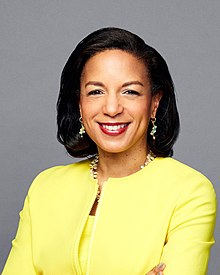Susan Rice | |
|---|---|
 Official portrait, 2021 | |
| 22nd Director of the Domestic Policy Council | |
| In office January 20, 2021 – May 26, 2023 | |
| President | Joe Biden |
| Preceded by | Brooke Rollins (acting) |
| Succeeded by | Neera Tanden |
| 23rd United States National Security Advisor | |
| In office July 1, 2013 – January 20, 2017 | |
| President | Barack Obama |
| Deputy | Antony Blinken Avril Haines |
| Preceded by | Thomas E. Donilon |
| Succeeded by | Michael Flynn |
| 27th United States Ambassador to the United Nations | |
| In office January 26, 2009 – June 30, 2013 | |
| President | Barack Obama |
| Deputy | Brooke Anderson Rosemary DiCarlo |
| Preceded by | Zalmay Khalilzad |
| Succeeded by | Samantha Power |
| 12th Assistant Secretary of State for African Affairs | |
| In office October 14, 1997 – January 20, 2001 | |
| President | Bill Clinton |
| Preceded by | George Moose |
| Succeeded by | Walter H. Kansteiner III |
| Personal details | |
| Born | Susan Elizabeth Rice November 17, 1964 Washington, D.C., U.S. |
| Political party | Democratic |
| Spouse |
Ian O. Cameron (m. 1992) |
| Children | 2 |
| Parent(s) | Emmett J. Rice (father) Lois Dickson Rice (mother) |
| Education | Stanford University (BA) New College, Oxford (MPhil, DPhil) |
| Occupation |
|
| Signature | |
Susan Elizabeth Rice (born November 17, 1964) is an American diplomat, policy advisor, and public official. As a member of the Democratic Party, Rice served as the 22nd director of the United States Domestic Policy Council from 2021 to 2023, as the 27th U.S. ambassador to the United Nations from 2009 to 2013, and as the 23rd U.S. national security advisor from 2013 to 2017.
Rice was born in Washington, D.C., and attended Stanford University and New College, Oxford, where she was a Rhodes Scholar and received a D.Phil. She served on President Bill Clinton's National Security Council staff from 1993 to 1997 and was the assistant secretary of state for African affairs at the State Department from 1997 to 2001. Appointed at age 32, Rice was at the time the youngest person to have served as a regional assistant secretary of state. Rice's tenure saw significant changes in U.S.–Africa policy, including the passage of the African Growth and Opportunity Act, support for democratic transitions in South Africa and Nigeria, and an increased U.S. focus on fighting HIV/AIDS.
A former Brookings Institution fellow, Rice served as a foreign policy advisor to Democratic presidential nominees Michael Dukakis, John Kerry, and Barack Obama. After Obama won the 2008 presidential election, Rice was nominated as ambassador to the United Nations. The Senate confirmed her by unanimous consent on January 22, 2009. During her tenure at the United Nations, Rice championed a human rights and anti-poverty agenda, elevated climate change and LGBT and women's rights as global priorities, and committed the U.S. to agreements such as the Nuclear Non-Proliferation Treaty, Convention on the Rights of Persons with Disabilities, and the U.N. Millennium Development Goals. She also defended Israel at the Security Council, pushed for tough sanctions against Iran and North Korea, and advocated for U.S. and NATO intervention in Libya in 2011.
Mentioned as a possible replacement for retiring United States secretary of state Hillary Clinton in 2012,[1][2] Rice withdrew from consideration following controversy related to the 2012 attack on a U.S. diplomatic facility in Benghazi.[3] President Barack Obama instead named her national security advisor in 2013, where she supported U.S. efforts on the Iran nuclear deal of 2015, the Ebola epidemic, the reopening to Cuba, and the Paris Agreement on climate change. In 2021, Rice became the director of the Domestic Policy Council in the Biden administration.[4]
- ^ "Susan Rice likely Hillary Clinton replacement". CBS News. November 12, 2012. Archived from the original on January 12, 2013. Retrieved November 13, 2012.
- ^ DeYoung, Karen; Miller, Greg (November 13, 2012). "Obama considering John Kerry for job of defense secretary". The Washington Post. Archived from the original on December 8, 2012. Retrieved November 12, 2012.
- ^ Connor, Tracy (December 13, 2012). "Susan Rice drops out of running for secretary of state, cites 'very politicized' confirmation process". NBC News. Archived from the original on January 26, 2018. Retrieved December 14, 2012.
- ^ @Transition46 (December 10, 2020). "Working families, veterans, farmers and producers, and those fighting for their place in the middle class will have partners in government once again. This experienced group will help us make it through this pandemic and thrive once the crisis is over" (Tweet). Retrieved December 10, 2020 – via Twitter.